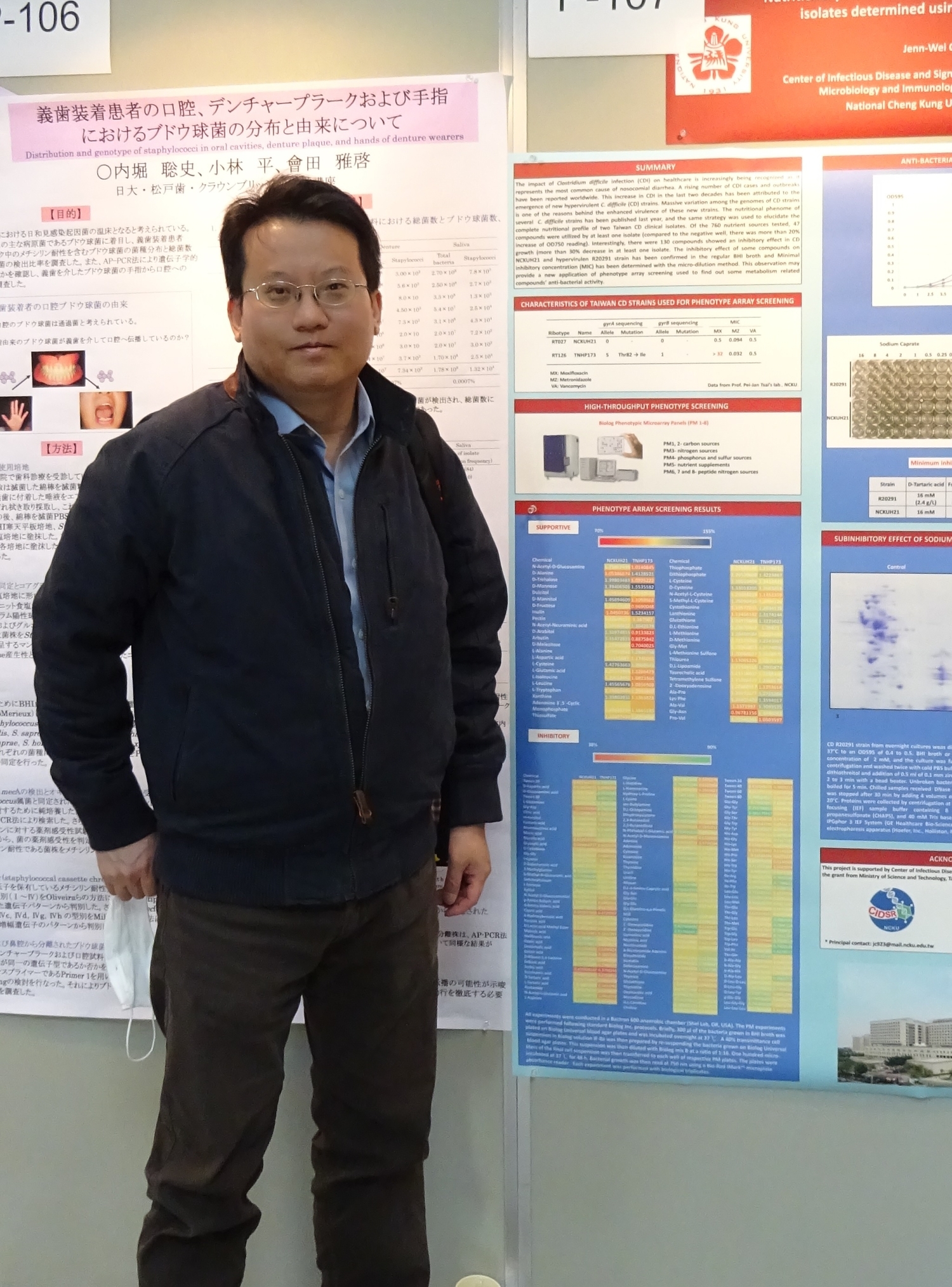Jenn-Wei Chen, Ph.D.
|
陳振暐 |
Jenn-Wei Chen, Ph.D. |
|
|
|
Tel (Office) |
886-6-235 3535 ext. 5635 |
|
Tel (Lab.) |
886-6-235 3535 ext. 5651 |
|
|
FAX |
(06) 208 2705 |
|
|
|
jc923@mail.ncku.edu.tw |
|
|
現職 |
助理教授 (2017/8-) |
|
|
Personal Web 中文版 |
||
小檔案
Education and Professional Experiences
1998-2000 Teaching Assistant, Department of Microbiology,
National Yang-Ming University
2000-2006 Ph. D., Institute of Microbiology and Immunology,
National Yang-Ming University,
2006-2007 Postdoctoral Associate,
National University of Singapore
2007-2010 Postdoctoral Associate, Cornell University
2010-2013 Research Associate, Cornell University
2013-2017 Research Assistant Professor,
National Cheng Kung University,
Specialties
Bacteriology, Microbiota research, Proteomics, Transcriptomics
Research interests
According to the latest estimation, the human body contains about almost equal number as many microbes as human cells, and most of them live in the gut. It is now apparent that human gut microbiome coevolves with human and that changes to this population can have major consequences, both beneficial and harmful, in immune development, metabolism, aging, and brain function, etc. My research focuses start from gut pathogenic bacteria, enterhemorrhagic Escherichia coli and Clostridium difficile, extend to the interactions between gut microbiota and gut pathogens/host. Systems biology approaches would be used as tools for elucidating the gene/compound function at our lab.
The main direction of the laboratory is:
1. Screening of the potential virulence genes of enterohemorrhagic Escherichia coli, to analyze the mechanism.
2. Screening the compounds to identify the inhibitors of Clostridium difficile, to analyze the mechanism.
3. The related gut microbiota studies.
PUBLICATION
- Kao CY, Chen JW, Wang S, Sheu BS, Wu JJ*. 2017. The Helicobacter pylori J99 jhp0106 Gene, under the Control of the CsrA/RpoN Regulatory System, Modulates Flagella Formation and Motility. Front. Microbiol., 2017 Mar 28;8:483.
- Kuo CJ, Chen JW, Chiu HC, Teng CH, Hsu TI, Lu PJ, Syu WJ, Wang ST, Chou TC, Chen CS*. 2016. Mutation of the Enterohemorrhagic Escherichia coli Core LPS Biosynthesis Enzyme RfaD Confers Hypersusceptibility to Host Intestinal Innate Immunity In vivo. Front Cell Infect Microbiol. 2016 Aug 12;6:82.
- Lin IT, Chiou YM, Liang YC, Lin CN, Sun WS, Li S, Chang CH, Syu WJ*, Chen JW*. 2016. Unique clustering genes in the bacterial chromosome affecting the type-III secretion of Enterohaemorrhagic Escherichia coli. Microbiology. 2016 Oct;162(10):1744-1754.
- Sun WS, Chen JW, Wu YC, Tsai HY, Kuo YL, Syu WJ*. 2016. Expression Regulation of Polycistronic lee3 Genes of Enterohaemorrhagic Escherichia coli. PLoS One. 11(5):e0155578.
- Janvilisri T, Suzuki H, Scaria J, Chen JW, Charoensawan V. 2015. High-Throughput Screening for Biomarker Discovery. Dis. Markers. 2015 108064.
- Scaria J, Suzuki H, Ptak CP, Chen JW, Zhu Y, Guo XK, Chang YF*. 2015. Comparative genomic and phenomic analysis of Clostridium difficile and Clostridium sordellii, two related pathogens with differing host tissue preference. BMC Genomics. 2015 Jun 10;16:448.
- Kao CY, Chen JW, Huang YT, Sheu SM, Sheu BS, Wu JJ*. 2015. Genome Sequence and Annotation of Helicobacter pylori Strain Hp238, Isolated from a Taiwanese Patient with Mucosa-Associated Lymphoid Tissue Lymphoma. Genome Announc. 2015 Feb 19;3(1).
- Scaria J, Mao C, Chen JW, McDonough SP, Sorbral B, Chang YF. 2013. Differential stress transcriptome landscape of historic and recently emerged hypervirulent strains of Clostridium difficile strains determined using RNA-Seq. PLoS ONE
- Faisal SM, Chen JW, Yan F, Chen TT, Useh NM, Yan W, Guo S, Wang SJ, Glaser AL, McDonough SP, Singh B, Davis WC, Akey BL, Chang YF. 2013. Evaluation of Mycobacterium aviumsubsp. paratuberculosis leuD mutant as vaccine candidate against challenge in a caprine model. Clin Vaccine Immunol. 20(4):572-81.
- Chen JW, Scaria J, Mao C, Sobral B, Lawley T, Henry C and Chang YF. 2013. Proteomic Comparison of Historic and Recently Emerged Hypervirulent Clostridium difficile Strains. Journal of Proteome Research. 12(3):1151-61.
- *Chandra S, *Faisal SM, Chen JW, Chen TT, McDonough SP, Liu S, Moreira MA, Akey BL, Chang CF, Chang YF. 2012. Immune response and protective efficacy of live attenuatedSalmonella vaccine expressing antigens of Mycobacterium avium subsp. paratuberculosis against challenge in mice. Vaccine. 31(1):242-51. (*Authors share equal contribution.)
- Chen JW, Scaria J, Chang YF. 2012. Phenotypic and transcriptomic response of auxotrophic Mycobacterium avium subsp. paratuberculosis leuD mutant under environmental stress. PLoS ONE 7(6):e37884. (equal contribution with Scaria J).
- Chen JW, Faisal SM, Chandra S, McDonough SP, Moreira MA, Scaria J, Chang CF, Bannantine JP, Akey B, Chang YF. 2011. Immunogenicity and protective efficacy of the Mycobacterium avium subsp. paratuberculosis attenuated mutants against challenge in a mouse model. Vaccine 30(19):3015-25.
- Faisal SM, Chen JW, McDonough SP, Chang CF, Teng CH, Chang YF. 2011. Immunostimulatory and antigen delivery properties of liposomes made up of total polar lipids from non-pathogenic bacteria leads to efficient induction of both innate and adaptive immune responses. Vaccine. 29(13):2381-91.
- Lin CN, Syu WJ, Sun WS, Chen JW, Chen TH, Don MJ, Wang SH. 2010. A role of ygfZ in the Escherichia coli response to plumbagin challenge. J Biomed Sci. 17(1): 84.
- Chen JW, Sun CM, Sheng WL, Wang YC, Syu WJ. 2006. Expression analysis of up-regulated genes responding to plumbagin in Escherichia coli. J. Bacteriol. 188:456-463.
- Tsai NP, Wu YC, Chen JW, Wu CF, Tzeng CM, Syu WJ. 2006. Multiple functions of l0036 in the regulation of the pathogenicity island of enterohemorrhagic Escherichia coli O157:H7. Biochem. J. 393:591-599.











